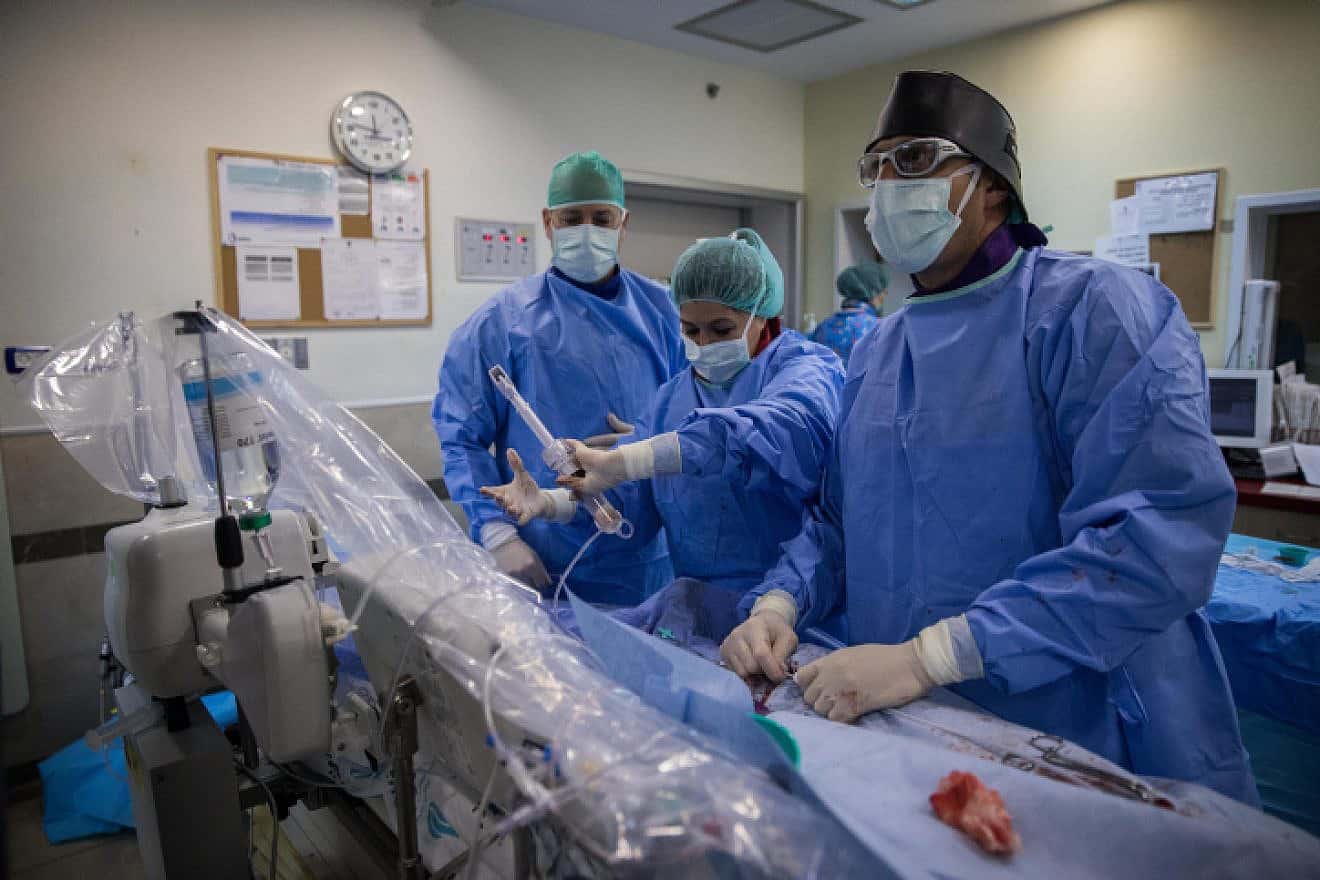Israeli doctors perform a cardiac catheterization at an operating room in the Wolfson Medical Center in Holon, April 11, 2018. Photo by Hadas Parush/Flash90.
Americans can aid the worthiest of causes, Israel’s frontline medical facilities.
I recently had the privilege of meeting with the head of Soroka Medical Center’s intensive-care unit and its chief of ophthalmology. I wanted to assess the situation of Israel’s injured soldiers, as well as the burden placed on the Beersheva-based hospital as the closest tier-three trauma hospital to the Gaza frontline. The morning I visited, every bed in the intensive-care unit but one was filled with a wounded soldier.
During my time at Soroka, my perspective changed from that of a journalist to that of a surgeon. I was briefed in detail about two of the most severely wounded soldiers in the ICU. These soldiers are the forgotten and untold stories of the Israel-Hamas war. Their number dwarfs those of the number killed in action.
One soldier had severe damage to his lower extremities and multisystem organ failure from an infection ravaging his body. His condition was very precarious. I was there just before he was to undergo an additional surgery. The surgery took place in the ICU because the young man was too unstable to be moved to the operating room. I was in awe of the compassion of the doctors, nurses, administrators and hospital staff.
Another soldier with a sutured 12-inch incision over his head to relieve brain swelling had already lost one eye and was paralyzed on one side. My heart sank when I met his father, who embraced the chief of ophthalmology for a long time, knowing that the doctors were doing everything they could but that his son was in dire straits. Then I was introduced to the soldier’s fiancée and my heart sank even further. The soldier was scheduled for another surgery in an attempt to save his one remaining eye.
I was next introduced to a medical retinal specialist tasked with coordinating eye care for soldiers in the ICU and those arriving injured from the field. The woman was exhausted but sustained by her unrelenting compassion. She had become something like a mother to the wounded soldiers and their grieving families.
I asked the chief of ophthalmology what they needed. Perhaps volunteer ophthalmic surgeons? He said they needed a vitreoretinal surgeon. I contacted a friend in the U.S. who is part of a doctors’ network organized to help Israel in its time of need. In just a few days, I was able to send the names of more than 10 American surgeons who were willing to leave their jobs to volunteer their services.
This article is written from the heart. It is far from my usual objective analysis of intelligence, security and defense issues. I write it because these stories need to be told. I am hopeful that Americans will come to recognize the sacrifice Israelis are paying with the blood of their sons, daughters, fathers, mothers, brothers and sisters to sustain the Jewish nation.
The resilience and unity I witnessed at Soroka and throughout the country as I traveled from the north to the south, to Tel Aviv and Jerusalem, was awe-inspiring. My fellow citizens in America are unaware of the sacrifices made by every Israeli. Nor do they understand that all of them are just one degree of separation from someone injured or killed.
One family I know had their 69-year-old father called up, along with his son, daughter, son-in-law and daughter-in-law. It is so hard for Americans, most of whom have never served in the armed forces, to relate to this—or to understand that Israelis are literally fighting for their homeland.
I hope that the wounded will not be forgotten and that, when their story is told, it will motivate people of goodwill to consider helping a vital cause: Soroka Medical Center and Israel’s other frontline hospitals and care facilities.
Dr. Eric R. Mandel is the director of MEPIN, the Middle East Political Information Network, senior security editor of The Jerusalem Report and a contributor to The Hill and The Jerusalem Post. He regularly briefs member of Congress and their foreign policy advisers about the Middle East.
